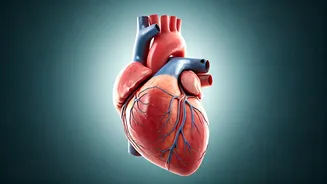What Is It?
Heart failure, a significant health concern, occurs when the heart cannot pump enough blood to meet the body's needs. This condition, which is more prevalent
than many realize, can result from various underlying problems. These include coronary artery disease, high blood pressure, and heart valve issues. Heart failure often manifests gradually, with symptoms worsening over time. Early recognition is vital for effective management. Symptoms such as breathlessness, fatigue, and swelling in the legs or ankles should prompt immediate medical evaluation. Various factors, including age, genetics, and lifestyle choices, contribute to the risk of developing heart failure. Regular check-ups and a heart-healthy lifestyle are essential for prevention and management.
Key Warning Signs
Identifying the warning signs of heart failure is crucial for early intervention. One primary symptom is shortness of breath, which may initially occur during physical activity and eventually worsen, even at rest. Fatigue and weakness are also common indicators, often stemming from the heart's reduced ability to circulate oxygen-rich blood. Swelling, known as edema, can develop in the ankles, legs, or abdomen due to fluid buildup. Other potential symptoms include a persistent cough or wheezing, especially when lying down, and a rapid or irregular heartbeat. Sudden weight gain from fluid retention is another warning sign. If any of these symptoms appear, prompt medical attention is advised. These symptoms may suggest the presence of an underlying heart problem, necessitating immediate medical evaluation.
Prevention Strategies
Preventing heart failure involves adopting a heart-healthy lifestyle and managing existing health conditions effectively. Regular physical activity is key, with moderate-intensity exercises recommended for at least 150 minutes per week. Maintaining a balanced diet low in saturated and trans fats, cholesterol, and sodium is crucial. Controlling blood pressure is paramount, and regular monitoring along with medication, if prescribed, is essential. Managing cholesterol levels through diet, exercise, and medication can also decrease the risk. Avoiding tobacco use and limiting alcohol consumption are vital lifestyle choices. Regular check-ups and adherence to medical advice are important. Taking these steps can substantially reduce the risk of developing heart failure and help preserve heart health.
Seek Medical Help
If you experience symptoms suggestive of heart failure, seeking immediate medical attention is extremely important. Early diagnosis and treatment can significantly improve outcomes. During a medical evaluation, a doctor will likely conduct a physical examination, review your medical history, and order tests. These tests can include an electrocardiogram (ECG) to assess the heart's electrical activity, an echocardiogram to examine the heart's structure and function, and blood tests to evaluate cardiac biomarkers. Treatment options vary depending on the severity and underlying causes of the condition, and may include medications to control blood pressure, reduce fluid retention, and improve heart function. In severe cases, more advanced treatments like pacemakers or, in extreme instances, a heart transplant, may be necessary.













